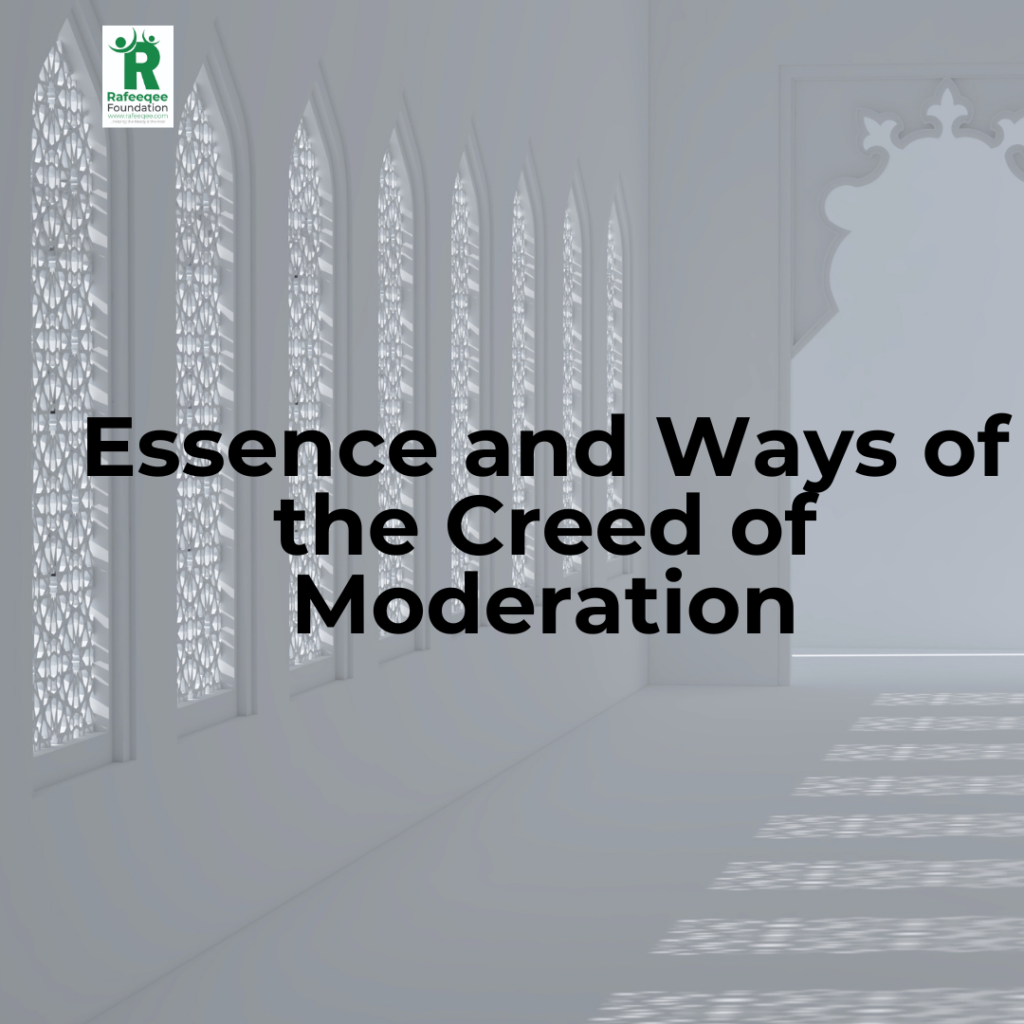Dawwah, Islamic Principles, Muslim Etiquette
Essence and Ways of the Creed of Moderation
The creed of moderation (Aqeedatul Wasatiyyah) is a central principle in Islam that emphasizes balance, fairness, and avoidance of extremes in all aspects of life, particularly in faith and practice. It reflects the Islamic ethos of being a “justly balanced” community (ummah), as stated in the Quran. Based on evidence from the Quran and Sunnah, this article delves into the essence of Aqeedatul Wasatiyyah with ways to embody the principles of moderation.
The Essence of Aqeedatul Wasatiyyah
The concept of moderation in Islam is explicitly highlighted in the Quran. Allah (SWT) says:
“And thus We have made you a just (moderate) nation that you will be witnesses over the people and the Messenger will be a witness over you.” (Al-Baqorah :143). This verse establishes that Muslims are to uphold a balanced approach, avoiding extremism and negligence in their beliefs, actions, and interactions with others. Moderation is not merely about compromise but represents the optimal path that aligns with divine guidance.
The Prophet Muhammad (PBUH) also emphasized moderation in his teachings. He said:
“Beware of excessiveness in religion, for those who came before you were destroyed due to excessiveness in religion.” (Ahmad 3248). This hadith underscores the importance of maintaining a balanced approach in religious observance, warning against the dangers of extremism.
Key Aspects of Aqeedatul Wasatiyyah
- Faith (Iman): Moderation in faith involves believing in Allah and adhering to His commands without falling into extremes, such as excessive skepticism or blind fanaticism. It entails worshiping Allah sincerely while recognizing human limitations.
- Worship (Ibadah): Balance in worship is crucial. The Prophet (PBUH) advised against excessive acts of worship that might lead to burnout or neglect of other responsibilities. He said:
“Religion is easy, and no one overburdens himself in his religion, but he will be unable to continue in that way. So do not be extremists, but try to be near perfection and receive the good tidings that you will be rewarded. Gain strength by worshipping in the mornings and afternoons and during the last hours of the night.” (Al-Bukhari 39)
- Social Conduct: Aqeedatul Wasatiyyah also governs social interactions. It calls for fairness, justice, and compassion in dealings with others. Allah (SWT) commands:
“Indeed, Allah commands you to render trusts to whom they are due and when you judge between people to judge with justice.” (An-Nisaai:58)
- Worldly Engagement: Islam encourages engaging with the world while preparing for the Hereafter. The Quran advises:
“But seek, through that which Allah has given you, the home of the Hereafter; and [yet], do not forget your share of the world.” (Al-Qosos:77)
Ways to Embody Aqeedatul Wasatiyyah
- Seeking Knowledge: Gaining a proper understanding of Islamic teachings helps prevent misinterpretation and ensures a balanced approach. The Prophet (PBUH) said:
“When Allah wishes good for someone, He bestows upon him the understanding of the religion.” (Al-Bukhari 71)
- Following the Sunnah: The life of the Prophet (PBUH) exemplifies moderation. By studying and emulating his practices, Muslims can achieve a balanced lifestyle.
- Avoiding Extremism: Both laxity and excessiveness in religious and worldly matters are discouraged. Muslims are encouraged to adopt the middle path as the Prophet (PBUH) instructed.
- Maintaining Justice: Upholding justice, even against oneself or close relations, is a practical manifestation of moderation. Allah (SWT) says:
“O you who have believed, be persistently standing firm in justice, witnesses for Allah, even if it be against yourselves or parents and relatives.” (An-Nisaa:135)
- Promoting Tolerance and Unity: A moderate approach fosters unity and discourages division. The Quran emphasizes:
“And hold firmly to the rope of Allah all together and do not become divided.” (Al-Imran:103)
To conclude, it is essential that we remember that Aqeedatul Wasatiyyah encapsulates the spirit of Islam as a religion of balance, justice, and mercy. By embodying moderation in faith, worship, social conduct, and worldly engagements, Muslims fulfill their role as a “justly balanced” community. This principle is not only a safeguard against the pitfalls of extremism but also a beacon guiding humanity toward harmonious living. Let us strive to embody Aqeedatul Wasatiyyah in our daily lives, as Allah (SWT) and His Messenger (PBUH) have commanded.

